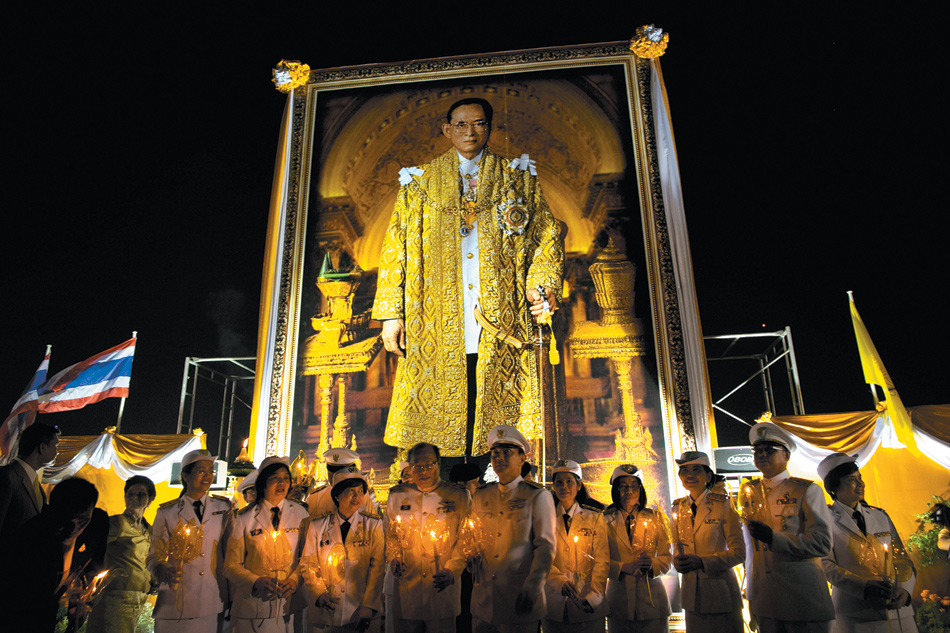Bangkok
She sits calmly smiling at me across the lunch table: quiet, matter-of-fact, professional. Yet just a week ago, Joop’s husband, Somyot Pruksakasemsuk, was condemned to ten years in prison for lèse-majesté—plus a further year on a related defamation charge. What was Somyot’s mortal insult to Thailand’s King Bhumibol Adulyadej, the world’s longest-reigning monarch?
A magazine he edited had published two articles: one, a tale about an unnamed family that kills millions of people to maintain itself in power, the other, a fictional story about a ghost that haunts Thailand and plots massacres. The court held that both referred to the king and his Chakri dynasty, and that merely publishing them merited ten years in prison under Article 112 of Thailand’s criminal code. As the Good Soldier Švejk exclaims in Jaroslav Hašek’s classic novel: “I never imagined that they’d sentence an innocent man to ten years. Sentencing an innocent man to five years, that’s something I’ve heard of, but ten, that’s a bit too much.”
At first it might be tempting to view Thailand’s lèse-majesté laws as a minor eccentricity in the exotic setting of The King and I, the self-styled “land of smiles,” a favored holiday destination for millions of Western tourists. But when you meet someone whose husband has been unjustly sentenced to more than a decade in prison, the smile is wiped off your face. As you look a little closer, you realize that all this is deathly serious. In a sense, the political future of an important Southeast Asian country hinges on that one small article of the criminal code. And these days, Anna, the governess in The King and I, might be locked up just for singing “Shall We Dance?”—let alone “Shall I Tell You What I Think of You?”—on a YouTube video.
As David Streckfuss explains in Truth on Trial in Thailand, his richly informative book on lèse-majesté in Thailand, early-twentieth-century edicts to protect the absolute monarch of Siam were originally inspired by European examples—notably that of Wilhelmine Germany. But over the last one hundred years, European and Thai law and practice have evolved in opposite directions. While lèse-majesté laws remain nominally on the statute books of some European countries, including Belgium, the Netherlands, and Spain, you can in practice say whatever you like about the queen of the Netherlands, who earlier this year announced her abdication, or the king of Spain—not to mention his son-in-law, the Duke of Palma, currently on trial for corruption. (Try that on the crown prince of Thailand.)
They order things differently in Thailand. Article 112 of the 1957 criminal code prescribed imprisonment “not exceeding seven years” for “whosoever defames, insults or threatens the King, the Queen, the Heir-Apparent or the Regent.” In a 1976 amendment, the prison term was increased to “three to fifteen years.” Then, after the September 2006 military coup that deposed the government of Thaksin Shinawatra, the number of lèse-majesté cases soared. Such charges inevitably became mixed up with the fierce conflict between the Yellow Shirts and Red Shirts that has roiled the country’s politics ever since. And Somyot is a very committed Red Shirt, a labor activist who also frontally challenged the legitimacy of Article 112 in the country’s constitutional court. That challenge seems to have provoked his arrest, five days after he launched his petition drive in 2011, whereas the magazine articles had appeared in 2010. (The constitutional court rejected his petition, which had collected more than ten thousand signatures, on the grounds that the king is “the center of the nation.”)
In the Internet age, these battles don’t stop at terrestrial frontiers. Like most other states in the world, Thailand has been struggling to assert its sovereignty over cyberspace. It has done so in a particularly disproportionate way on just this issue. A BBC correspondent, Jonathan Head, was charged with lèse-majesté for saying that the Thai people were worried about the succession—which, if you talk to anyone ready to speak about it privately, they clearly are. The past excesses of the current heir recounted in Paul Handley’s book The King Never Smiles help explain why.* The police lieutenant colonel who had lodged the charge against the BBC correspondent actually admitted to Streckfuss: “The truth can’t be said.”
The whole of YouTube was blocked here for some time because of videos allegedly “insulting” the king. It was unblocked after YouTube agreed not to allow computers with an Internet Protocol (IP) address in Thailand to have access to those particular videos. (IP addresses are generally assigned in blocks to countries, and such filtering by national IP address seems to be becoming a new international norm.) In December 2011, an American blogger, Joe Gordon, was sentenced to two and a half years in a Thai prison, just because he had linked on his blog to downloadable Thai-language excerpts from Paul Handley’s biography of the king. He was released last summer—on a royal pardon. This leaves me wondering which century we’re in. The twenty-first? The seventeenth? Or, most plausibly, some weird mixture of the two.
Advertisement
I was invited by the European Union delegation in Bangkok to speak at a seminar on “reconciliation and freedom of expression.” In response to this seminar, there was a small demonstration of ultra-royalists—dark-yellow shirts, so to speak—outside the EU delegation office.
I left Thailand for Burma with a clear sense that this state of affairs is not just unacceptable but also unsustainable. No one is doing the monarchy itself, let alone the whole “land of smiles,” any service by the blatantly political abuse of lèse-majesté law to hand down sentences such as that on Somyot. As Europe’s surviving royal houses have learned, to strangle open, democratic debate about the royal family is no way to secure the future of a constitutional monarchy. More broadly, history teaches that trying to stave off reform only increases the likelihood of revolution.
And if, for writing this article, next time I pass through Bangkok I am detained “as a guest of His Majesty”—to adapt a delightful British euphemism for a period spent in one of Her Britannic Majesty’s prisons—then so be it. It will help to make the point. Perhaps the EU might even lift a finger on my behalf. And I promise not to spend my enforced leisure singing any hits from The King and I.
—This is the second of three articles on free speech in South and Southeast Asia. A third article, on Burma, will appear in a coming issue.
This Issue
May 23, 2013
MoMA’s Act of Destruction
An Original Thinker
Maggie
-
*
Paul M. Handley, The King Never Smiles: A Biography of Thailand’s Bhumibol Adulyadej (Yale University Press, 2006). ↩



